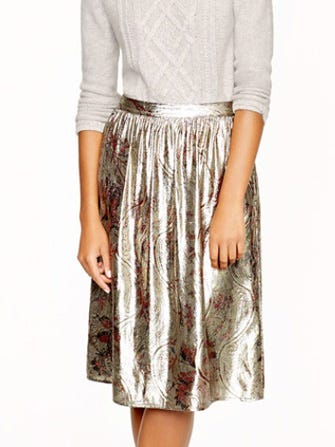 Photo: Courtesy of J. Crew
Photo: Courtesy of J. Crew
Can a bias-free algorithm, untainted by human subjectivity, really be the secret to the best shopping site of all? The innovative women behind fashion-meets-tech start-up Rank & Style sure hope so. Attempting to separate themselves from the ShopStyle-inspired aggregator community, they use sheer mathematics to give the customer the most buzz-worthy result for their shopping queries. If you type in "black leggings," they'll present you with a result engineered to cater to what you probably will be looking for. Based on what? Trending articles, user reviews, editor reviews, social media content, and more. Obviously, Rank & Style founders Sarika Doshi, Pooja Badlani, and Sonal Gupta aren't sharing their specific formula, but say it's designed to simplify, not complicate, the shopping experience, calling it a hybrid of BuzzFeed and a trendier Consumer Reports. "Shopping, solved" boasts their homepage banner. That sounds great! But will the scientific approach to shopping really transform how we deal in e-commerce?
More likely, it will mainly procure quick, high-impact results to the sort of shopper who doesn't like to pore over pages of results. For those who believe in the "tyranny of choice" theory, Rank & Style may just be your new favorite thing. As Sarika told Racked: "Our site saves people time and adds transparency in a world of overwhelming content and noise." They do this by releasing four "Top Ten" lists per week, ranking popular items in a category, based on industry, viral, and social buzz. Theoretically, this means that when you do search for "black leggings" (or faux fur vests, or what have you), you'll be getting the 10 "certified-fresh" options available. Rank & Style only launched in April, so it's too early to tell whether it's really catching on yet, but the principle is attracting attention. But, of course, they face the challenges any start-up company does — plus a few extras.
Since the site aims for total objectivity, it can't really partner up with brands or promote particular items in exchange for profit (until a brand's relevant product actually ranks on R&S, at least). Sonal says: "Whatever the data says goes, so we can't promote products. Instead, we have to figure out creative ways to partner with brands, to spread the word, and to be able to bring in revenue." Sounds like an uphill battle, but we admire the women's scientific approach to the often highly irrational, impulsive venture of shopping. That said, we're not sure we're quite ready to give up our 86 pages of "minimal trench" shopping results just yet. After all, page 74 just might reveal the destiny-altering coat of our dreams! (Racked)
AdvertisementADVERTISEMENT






